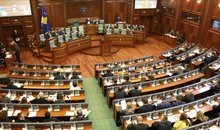
 Flash News
Flash News
Theth action, resident in tears: I built on my land with my life's expenses, the state should not destroy it
Directors targeted! After Fier and Durrës, Rama arrives in Elbasan
Name/Identification of the 23-year-old found dead near Shkopet Lake
IKM action in Theth, residents come out in protest
Reported missing by his father, 23-year-old found dead near Shkopet lake

Long prison sentences, heavy fines and travel bans.
These are among the punishments women face who violate Iran's new hijab law.
Passed on November 30, the Hijab and Chastity Law caused a stir in the Islamic Republic, with some senior clerics also criticizing it.
The 74-article law also requires the public to report suspected offenders to the police and penalizes businesses and taxi drivers who refuse to do so.
"You can't even call this a law," Nasrin Sotoudeh, a well-known activist and human rights lawyer who works in Iran, tells Radio Free Europe.
The laws are intended to protect citizens, but the new legislation "takes away the safety of women on the streets," according to her.
Recently, more and more women in Iran have been refusing to wear the mandatory headscarf, which is a main pillar of the Islamic system.
The hijab was at the center of unprecedented protests that erupted across Iran in 2022.
They were sparked by the death in custody of Mahsa Amin, a young woman who was arrested for allegedly violating the hijab requirement.
During the protests, many women and girls removed and burned their headscarves.
Authorities brutally suppressed the protesters, killing hundreds and arresting thousands.
Sotoudeh says many Iranians want those responsible for the deaths "to be punished."
But instead, "lawmakers passed a vindictive law against women and men," according to her.
She warns that critics "will take action" if the law is not repealed, suggesting there could even be protests.
Sotoudeh was in prison for years for her activism and addressing sensitive legal issues, including cases of women detained for peaceful protests against mandatory hijab.
Recently, authorities have increased measures to oversee the implementation of the hijab obligation.
They restored patrols by the so-called morality police, which were suspended in the wake of the 2022 protests.
Iran's Islamic Revolutionary Guard Corps (IRGC) also created a new unit in Tehran to oversee the wearing of the hijab. Its members are called "Ambassadors of Goodwill."
In November, the Tehran Headquarters for the Promotion of Virtue and the Prevention of Vice announced the establishment of a "clinic" offering "scientific and psychological treatment" for women who refuse to follow the Islamic dress code.
Iranian psychologists responded, warning that healthy people could be labeled as sick.
In a joint statement issued on December 1, Sotoudeh and Sedigheh Wasmaghi, a human rights activist and Islamic scholar, criticized the new hijab law, calling it "shameful" and "medieval."
The new legislation became so controversial that President Masoud Pezeshkian said in a live television appearance on December 2 that "it cannot be implemented easily."
He also questioned the new penalties for violators of the hijab obligation.
Even some senior clerics spoke out against the new law.
"Not only are large parts of this law unenforceable... but it defeats its purpose and will make young people hate religious teachings," Ayatollah Mostafa Mohaqeq Damad wrote in an open letter to senior clerics on December 2.
In a joint statement on December 4, three prominent associations representing the entertainment industry said that any law that "turns the homeland into a huge prison is meaningless" and urged authorities to repeal it./ REL
Latest news



Hoxha: We will have a parliament that will surpass any comedy program!
2025-07-09 10:10:32

Directors targeted! After Fier and Durrës, Rama arrives in Elbasan
2025-07-09 09:53:57
Name/Identification of the 23-year-old found dead near Shkopet Lake
2025-07-09 09:42:34
IKM action in Theth, residents come out in protest
2025-07-09 09:34:54
Reasons why the EU has not imposed new sanctions against Russia
2025-07-09 09:18:35
DW: Online scams increase human trafficking
2025-07-09 09:01:29

Reported missing by his father, 23-year-old found dead near Shkopet lake
2025-07-09 08:42:13

Horoscope, what do the stars have in store for you today?
2025-07-09 08:25:44
Sun and rain, Wednesday with unstable weather
2025-07-09 08:06:58
Posta e mëngjesit/ Me 2 rreshta: Çfarë pati rëndësi dje në Shqipëri
2025-07-09 07:52:02

Tabaku: Salianji bore a political cost that no one in Albania has borne
2025-07-08 22:36:15


Sekretet për të shijuar verën si një ‘profesionist’
2025-07-08 21:45:06


Albania's Waste Crisis: Toxic Smoke and Deep Governance Problems
2025-07-08 21:13:07
Alarming pollution in Fushë-Arrëz, copper factory waste turns the Fan River red
2025-07-08 21:07:14

Poll/ How do you assess the Prime Minister's intervention in local government?
2025-07-08 20:40:01
28 arrested in Italy and Spain for drug trafficking, including an Albanian
2025-07-08 20:24:14
Residents clash with police in Theth: We are on our land
2025-07-08 20:11:41
Death of 27-year-old in Lipjan, Osmani: To be investigated independently!
2025-07-08 20:06:52
Trump promises US will send more weapons to Ukraine
2025-07-08 19:54:25

EU targets health, education, police and cadastre as areas of corruption
2025-07-08 19:23:34




Salianji after his return: I did not oppose for functions, but for vocation
2025-07-08 18:23:15
Will he run in the 2029 elections? Here's how Salianji answers
2025-07-08 18:16:09
Boat captain drowns after diving into water to save two tourists in Shkodra
2025-07-08 18:05:12
Salianji from the DP headquarters: I brought a drug trafficker to justice
2025-07-08 18:03:26
After Fier, Rama "landes" in Durrës, dismissals expected
2025-07-08 17:53:32
Ervin Salianji arrives at the blue headquarters, welcomed by supporters
2025-07-08 17:45:12

EU approves final steps for Bulgaria's Eurozone membership
2025-07-08 17:43:06

Zhupa after Salianj's release: Inspiration for every opposition member
2025-07-08 17:19:39
Actor David Killick passes away
2025-07-08 17:09:23



Threatened with dismissals, Rama arrives at the Fier municipality
2025-07-08 16:39:19
Extreme temperatures temporarily close Acropolis in Greece
2025-07-08 16:30:34

A plot of cannabis is discovered in Mazha, Kruja
2025-07-08 16:13:48

Republika Srpska allocates additional 22 million euros for lobbying in the US
2025-07-08 15:52:04

Spices that protect you from mosquitoes!
2025-07-08 15:30:03

Accident on the Vlora-Qeparo axis, one injured
2025-07-08 15:11:52
Berat, 17 years part of UNESCO's world heritage
2025-07-08 15:03:30


Cost of living increases, inflation rises to 2.4% in June, driven by food
2025-07-08 14:29:54
VIDEO/ Restaurant roof collapses in Italy, one victim and ten injured
2025-07-08 14:18:44
Requested release from cell, Supreme Court leaves Veliaj in prison
2025-07-08 14:07:41
TikTok shutdown/ Austrian media: Rama benefited politically from the app ban
2025-07-08 13:48:25
Acropolis temporarily closed due to heat
2025-07-08 13:31:09



Salianj's release/Berisha: He was politically condemned by Rama and Xhafa!
2025-07-08 13:00:13

Knife attack on Peshkopia Boulevard
2025-07-08 12:44:10


Fier Court decides on the conditional release of Ervin Salianj
2025-07-08 12:15:23
Cost of living increases, inflation rises to 2.4% in June due to food
2025-07-08 12:00:16


Requesting conditional release, Ervin Salianji arrives at the Fier Court
2025-07-08 11:16:36
The first phase of university applications begins today
2025-07-08 11:10:52
Fire in Lura, flames endanger the National Park
2025-07-08 10:53:43
Trump warns of 35% tariffs on Serbia and 30% on Bosnia and Herzegovina
2025-07-08 10:37:32
Thethi rooster and the dung cock
2025-07-08 10:24:01

Fire in Dukat endangers Llogara National Park
2025-07-08 10:01:39
International drug search: 36-year-old arrested in Durrës (NAME)
2025-07-08 09:50:48
Thethi, tourists "criticize" modern trend
2025-07-08 09:39:54
Fire on Mount Dukat still active, Llogara National Park at risk
2025-07-08 09:28:12
Veliaj's appeal to be heard today in the High Court
2025-07-08 09:16:02
"Bad sign for democracy"/ Parliament neglects reporting by institutions
2025-07-08 09:04:56
Today's hearing at the Fier Court, Salianji requests conditional release
2025-07-08 08:56:39


Horoscope, what do the stars have in store for you today?
2025-07-08 08:16:19
Weather forecast/ How temperatures will vary throughout the day
2025-07-08 08:02:37
Morning Post/ In 2 lines: What mattered yesterday in Albania
2025-07-08 07:48:30

